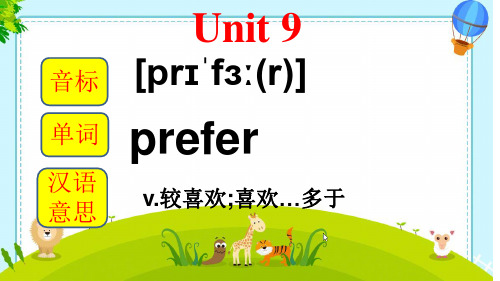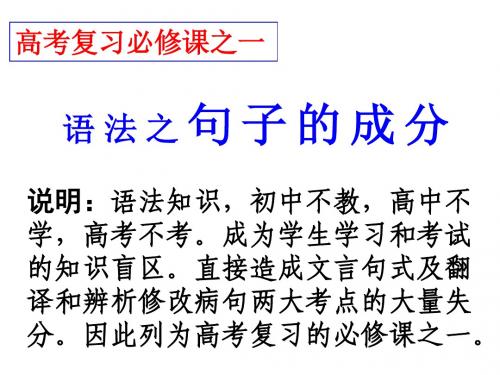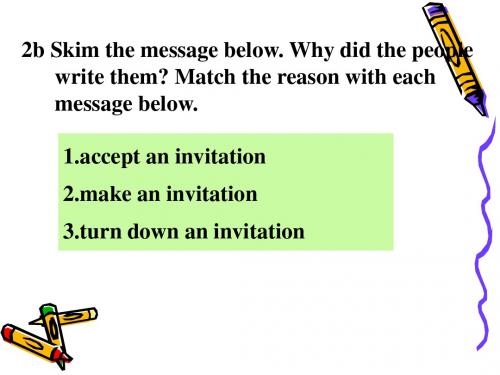U9 语法笔记.ppt
[法语学习]U9U13
![[法语学习]U9U13](https://img.taocdn.com/s3/m/cb14a443e009581b6bd9ebf8.png)
❖ Texte
Je suis dans le département de français. Je suis en troisième année. Nous avons beaucoup de professeurs de français. Ils sont chinois. J’apprends deux langues étrangères: le français et l’anglais. J’apprends l’anglais comme seconde langue étrangère. L’anglais n’est pas très difficile pour moi. Je fais beaucoup d’exercices d’anglais.
je - e tu -es il/elle -e ❖ De代替des
notre votre leur nos vos leurs
nous - ons vous -ez ils/elles -ent
❖ La France bienvenu,e la Chine le programme une heure le cours le lundi le mardi le mercredi le jeudi le vendredi
8. Voilà des lettres. Ce sont les lettres de Pierre?
❖ J’ai un frère. ❖ Nous avons des cours aujourd’hui. ❖ Ils ne font pas d’exercices. ❖ Les étudiants n’ont pas de professeurs
九年级上册第九单元英语单词复习Unit9单词音标大声朗读 教学PPT课件

v.将…刺入(或插入);刺;戳; 插入
单词 stick to
汉语 意思
紧随;紧跟;呆在…近旁
音标 [daʊn]
单词 down
汉语 adv.向下;朝下;在下面
意思
音标 [ˈdaɪəlɒɡ]
单词 dialog
汉语 意思
n.会话,对话
音标 [nəʊt]
单词 dialog
汉语 n.笔记;记录;短笺; 意思 便条;注释;按语;批注
音标 [ˈlaɪftaɪm]
单词 lifetime
汉语 意思
n.一生;终身;有生之年
音标 [ˈpɪti]
单词 pity
汉语 意思
n.同情;怜悯
音标 [ˈtəʊtl]
单词 total
汉语 意思
adj.总的;总计的;全体的
单词 in total
汉语 意思
总共;总计
音标 [ˈmɑːstə(r)]
音标 [ˈendɪŋ]
单词 ending
汉语 n.(故事、电影等的)结尾, 意思 结局
音标 [ˌdɒkjuˈmentri]
单词 documentary
汉语 n.纪录影片;纪实广播(或电视) 意思 节目
音标 [ˈdrɑːmə]
单词 drama
汉语 意思
n.戏;剧;戏剧文学
音标 [ˈplenti]
单词 once in a while
汉语 意思
偶尔;间或
音标 [ɪnˈtelɪdʒənt]
单词 intelligent
汉语 adj.有才智的;悟性强的
意思
音标 sense
单词 sense
汉语 n.感觉官能(即视、听、嗅、 意思 味、触五觉)
初三语文语法之句子成分讲解课件(共24张PPT)

找出补语
1.广 大 人 民 干 得 热 火 朝 天〉 。 〈 2.他 写 的 字 比 原 来 好 得 。 〈多 〉
3.他 生 于1918 年〉 。 〈
4.他 坐 在 桌 子 旁〉 。 〈 5.颜 色 是 那 么 浓, 浓 得
。 〈好 像 要 流 下 来 似 的〉
昨天全体同学 ‖都 做 完 了 语 文 作 业 。
昨天全体同学 ‖都 做 完 了 语 文 作 业 。
第三步——划定定语、状语、补语 [昨 天 ]全 体 ( ) ( ) 同 学[都] 做完了 语文 作业。 〈 〉
划分下列句子的句子成分 1. 喜欢阅读的他十分认真地读 完了两本书。
1.(喜欢阅读)的他‖[十分认真]地读 〈完〉了(两本)书。 2.我所遇到的毕竟还是好人多 于坏人。
高考复习必修课之一
语法之句子的成分
说明:语法知识,初中不教,高中不 学,高考不考。成为学生学习和考试 的知识盲区。直接造成文言句式及翻 译和辨析修改病句两大考点的大量失 分。因此列为高考复习的必修课之一。
语法单位按照由小到大的顺序 分为 语素、词、短语、句子、句群。 其中“语素”不作了解,学习 的重点是“句子”。
找出定语
警察反复观察了目击者提供的弹壳, 并进行技术分析,确定它们和从案发 现场得到的弹壳并不是出自同一支枪。 警察反复观察了目击者提供的弹壳, ( )
并 进 行 (技 术) 分 析 ,
确 定 它 们 和 从 案 发 现 场 得 到) (
的弹壳并不是出自 同 一 支) 枪。 (
5.状语
状语是动词或形容词前面的连带 成分,用来修饰、限制动词或形 容词,表示动作的状态、方式、 时间、处所或程度等。
人教版八年级下册英语Unit 9知识点梳理及语法讲义(学生版)

八年级下册英语Unit9知识点与语法精讲精练(一)完成单词梳理:名词:1.娱乐;游戏 2.照相机 3.发明;发明物4.坐便器;厕所5.表演;演出6.主题7.供骑乘的游乐设施8.省份9.狐狸10.赤道11.春天12.地点;位置动词:1.发明;创造 2.鼓励 3.收集;采集代词:1.(it的反身代词)它自己副词:1.在某处;到某处 2.仅仅;只;不过 3.主要地;通常数词:1.一千连词:1.不管……(还是);是否 2.在任何……的时候;无论何时形容词:1.难以置信的;不真实的 2.迅速的;快速的3.特别的;不寻常的4.社会的5.和平的;安宁的6.完美的;完全的7.安全的;无危险的兼类词:1.(v/n)进步;进展2.(adj)德国的;德语的;德国人的(n)德语;德国人3.(v/n)害怕;惧怕4.(adj)印度的(n)印度人5.(adj)日本的;日本人的;日语的(n)日本人;日语(二)词汇变形小结:1.invent发明(v.)→____________(n.)发明;发明物→____________(n.)发明家2.believe相信(v.)→____________(adj.)可信的→____________(adj.)难以置信的;不真实的3.rapid迅速的(adj.)→____________(adv.)迅速地ual平常的(adj.)→____________(adv.)通常→____________(adj.)不寻常的5.encourage鼓励(v.)→____________(n.)鼓励6.society社会(n.)→____________(adj.)社会的7.peace和平(n.)→____________(adj.)和平的→____________(adv.)和平地8.perform表演(v.)→____________(n.)表演;演出9.perfect完美的;完全的(adj.)→____________(adv.)完美地;完全地10.collect收集;采集(v.)→____________(n.)收集;收藏品→____________(n.)收集者;收藏家11.German德语;德国人;德国的(n./adj.)→____________(复数)→____________(n.)德国12.safe安全的(adj.)→____________(adv.)安全地→____________(n.)安全13.simple简单的(adj.)→____________(adv.)仅仅;只;不过14.India印度(n.)→____________(adj./n.)印度的;印度人15.Japan日本(n.)→____________(adj./n.)日本的;日本人→____________(复数)16.fox狐狸(n.)→____________(复数)17.most大多数的(adj.)→____________(adv.)主要地;通常【练一练】用所给词的适当形式填空1.They plan to go to the zoo to see____________(fox)this weekend.2.Because of losing the job,he lived much____________(simple)than before.3.On weekends,we____________(most)go out for a trip or vacation.4.It is strange that Nick always does____________(usual)things.5.Blue is a____________(peace)color.People often feel quiet in blue rooms.6.It’s____________(believe)that he passed the exam without working hard.7.Team sports help to develop a child’s____________(society)skills.8.Our teachers often tell us the importance of____________(safe).9.What do you think is the greatest____________(invent)of the twentieth century?10.They are from Germany.They are____________(German).11.These____________(India)like Chinese food very much.12.Lily’s father has a large____________(collect)of old coins.13.There are two____________(camera)on that table.Are they yours?14.The little monkey is looking at____________(it)in the mirror.15.Look,there are three____________(Japan)over there.(三)短语攻关:游乐场了解导致取得进步鼓励某人做某事茶艺茶具考虑两个;一对;几个兜风数以千计的;许许多多的度假一方面……另一方面……全年靠近远离1.Let’s go somewhere different today.今天咱们去不同的地方吧。
2019年U9sectionB精品教育.ppt

3a Read the invitation and answer the questions. Dear Parents, I would like to invite you to the opening of our new library at No.9 High School. The opening will be on the morning of Wednesday, January 8th at 9:00. After this, you can enjoy our school concert. Then
2b Skim the message below. Why did the people write them? Match the reason with each message below.
1.accept an invitation 2.make an invitation 3.turn down an invitation
2 Dear classmates, As I’m sure you know by now, our favorite teacher, Ms. Steen, is leaving soon to go back
to the US. We’re very sad that she’s leaving because she is a fun teacher. To show how much we’re going to miss her, let’s have a surprise party for her next Friday the 28th!
人教版九年级初中英语语法复习课件---名词 (共25张PPT)

( B ) 6. This is not my cap, but my _______. A. brothers C. brothers’ B. brother’s D. brother
( B )7.They write most of their_______ in English. A. business letter B. business letters C. businesses D. businesses letters
He spends much time in playing computer games every day.
迈克在家几乎不做家务。 Mike does little housework at home.
名词的一般用法---名词做定语
1.修饰另一名词时,一般用单数 昨天我种了两棵苹果树。 I planted two apple trees yesterday. 2.man woman用做定语时,应与后面的名词保持数 的一致
Choose the best answers.
(1)—How many ____ do you want? A —A kilo, please. A. bananas B. meat C. bread D. milk (2)—Taking a walk in the evening is a good ____. C —So it is, it keep us healthy. A. rule B. hobby C. habit D. favor (3)These people are from _______. D They are _______. A. Germany; Germen B. German; Germany C. Germany; Germanies D. Germany; Germans (4)Would you pass me ______? B I want to write a letter. A. a paper B. a piece of paper C. two paper D. two piece of paper
新时代核心英语教程写作1教学课件(U9)
Use of periodic sentences
Use of periodic sentences
The periodic sentence is usually emphatic and conclusive because the weight of the statement falls on the long-awaited predication.
Use of periodic sentences
The periodic sentence is usually emphatic and conclusive because the weight of the statement falls on the long-awaited predication.
• Loose: Wilbur awoke and looked for Charlotte the next morning when the first light came into the sky and the sparrows stirred in the trees, when the cows rattled their chains and the rooster crowed and the early automobiles went whispering along the road.
• Technically, they are often brilliant and innovative products not only of new skills and devices but also of imaginative minds.
Placement of important ideas
Unit 9 语法讲练-七年级上册英语教学课件(人教版)
探究三:特殊疑问句中特殊疑问词的用法
一、when when作疑问副词, “什么时候,何时”用来询问时间,既可询问某个时 段或时刻,也可询问具体的日期。例如: When does he go to school? When is your class meeting? 二、why why作疑问副词,“为什么”用来询问原因或理由 对于why 引导的特殊疑问句,答句通常用because — Why do you like geography? — Because it’s fun.
What's your favorite day? My favorite day is _____.
Weekdays (工作日)
Weekends (周末)
Lead in Look at the chart. Ask and answer.
科目
语文 数学 科学 音乐 体育
时间
星期一/星期二 星期一/星期五 星期二/星期三
It’s ___o_n____ _M__o_n_d_a_y__ and _F_ri_d_a_y___.
wh-
Part 1: key words.
Task1: Circle the “wh-” words. Task2: Circle the key words of the answer.
xxx
B: My favorite subject is…
A: Why do you like…
P.E. music math
B: Because it is…
computer history
interesting difficult fun
exciting relaxing
English science
Units9-10单元知识点汇总复习课件人教版八年级英语上册
我们当1然7会.b感e觉g更la糟d糕t,o 除do非高我们兴跟做人讲出来。18.be surprised to do惊讶做
19.refuse to do拒绝做 20.invite sb to do/to sp邀请某人做/去
21.be busy doing忙于做 22.without doing没有做
4. catch you =see you = Bye catch a cold感冒 catch the train 赶上火车 5. accept 接受 反义词 refuse accept指愿意接受 receive指客观上收到,但主观上不一定接受。 I received his gift yesterday, but I wouldn’t like to accept it. 6. surprised adj 感到意外的,修饰人 be surprised to do sth 对做某事感到意外 surprising adj 令人惊讶的,修饰物 surprise n 惊奇、惊讶 to one’s surprise使某人吃惊,动词,使惊奇,使感到意外
三、语法
1.情态动词用法: 1.)can的用法(一提二变三照抄) Can you ......? 句式表示发出邀请,多用于口语 肯定回答:Sure, I’d love to. Sure, I’d like to.
That would be nice, thanks! My pa否ren定ts, f回rien答ds a:ndSclaosrsmrya,teIs wciallnco’met,.you canNseoe ,thtehmainn kthse.party. I’m afraid not. tIhheavoepteonipnrgepoaf…Ire’的fo开rda张nloexvaem3.0to. , but I’m afraid I have no time. fight w2i.t)h 和m. ust用法 bcuritnsgtmh带in来uhs,atlf拿强把来某调物P说l切ea成s话e两a者sk半y主our观fath上er t认o br为ing必you须r bo做ok.某事,含有主观判断的意味。 你只要具跟有人聊强聊制这个性问的题,意你味就已,经m解u决s了tn问’题t的表一半“。禁止;不允许”不可轻易使用 hSoavmeeaMpheeuoapsdletacbIheefliei头nve痛isthhe wm4o2yrs.ththoinmg ies two doorkno?thing. You’re肯ha定lfwa回y to答sol:viYngeasp,royboleummjusut bsyt.talking to someone about it!
大学英语语法(全)PPT课件
38
• 2、天气糟透了。整天刮大风下大雨的。 The weather was so bad. It blew hard and rained heavily all the day.
(翻译时必须补出主语It。)
15
• 这位父亲问他女儿的男朋友(其正准备开车带他 女儿出门):Do you drink?他真正的意思是问这 个年轻男子是否有饮酒的习惯,即在询问情况, 而不是问他现在想不想喝酒,即不是在提议。
16
• 因此,从交际的角度去看待语法,在具体语境中考 查语法规则的使用,通过语篇、语境驾驭语法来达 到十分具体的交际目的。我们不仅知道“应该”怎 么说(what learners should say),更应该去了解为 什么英语本族语者要“这样”说(what native speakers of English actually do say and why)。
5
语法的三个层面:形式、意义、用法
• 形式:某个语法结构怎样构成的。比如 “现在完成进行时”的结构形式是have been doing。这是使用语法规则的起点, 即首先要做到能够准确地构造某个语法结 构,这是语法结构的准确性问题。
6
• 意义:某个语法结构表达的意义。比如“现在完成 进行时”可以表示“一个活动从过去一直延续到现 在说话时刻”这样的含义,这就是现在完成时态这 一结构所具备的语法意义。由此可以看出,特定意 义一般是对应于特定的结构形式的,或者说,特定 的结构形式能够表达特定的意义(Particular forms will express their particular meanings)。对于一个句子,它的含义不仅仅是 来自于句中所使用的词汇的含义,而是还有来自于 其中特定语法结构所含有的语法意义。
- 1、下载文档前请自行甄别文档内容的完整性,平台不提供额外的编辑、内容补充、找答案等附加服务。
- 2、"仅部分预览"的文档,不可在线预览部分如存在完整性等问题,可反馈申请退款(可完整预览的文档不适用该条件!)。
- 3、如文档侵犯您的权益,请联系客服反馈,我们会尽快为您处理(人工客服工作时间:9:00-18:30)。
There is no air _____ no water on the moon.
There is no air _____ water on the moon. 月球上没有空气和水。
1.practice ①n. 练习;实践[U] much / a lot of / lots of practice 大量的练习
Learning a language needs a lot of ________. ② v.训练;练习 (vi./vt.)
If you want to learn English well, you must ________ every day.
It’s time _____ lunch. It’s time _____ have lunch.
对他来说是时候做作业了。 It’s time _____ him _____ _____ his homework.
4. no adj. 没有的 对于[U]名词或[C]名词的复数而言:no = not any 对于[C]名词的单数而言:no = not a
※ 练习做某事 practice doing sth. Jenny _________ Japanese just now.
Emma often ________ _______ the piano.
Kelly is __________ ________ now.
2. spend ① v. 度过 ② 花费(时间;金钱) 过去式: spent ① spend the weekend 度过周末 你怎样度过你的寒假?
He has no hair. = He doesn’t have any hair.
There is no apple in the fridge.
= There isn’t an apple in the fridge.
没有A和没有B no ____ B
= Tony _____ 10 dollars __________ this new book.
I spent an hour _____ my homework.
= I _____________________________________.
3. It is time to do sth. 该是做某事的时候了。 It’s time _____ sth. 对某物来说是时候了 It’s time (____ sb.) ______ sth. 对某人来说是时候做某事了。
How did you spend your summer holiday? ② spend + 时间/金钱+ ______ sth.
在某物上花费…时间/金钱 spend + 时间/金钱 + _________ sth. 花费…时间/金钱做某事
Tony ____ 10 dollars ______ this new book.
